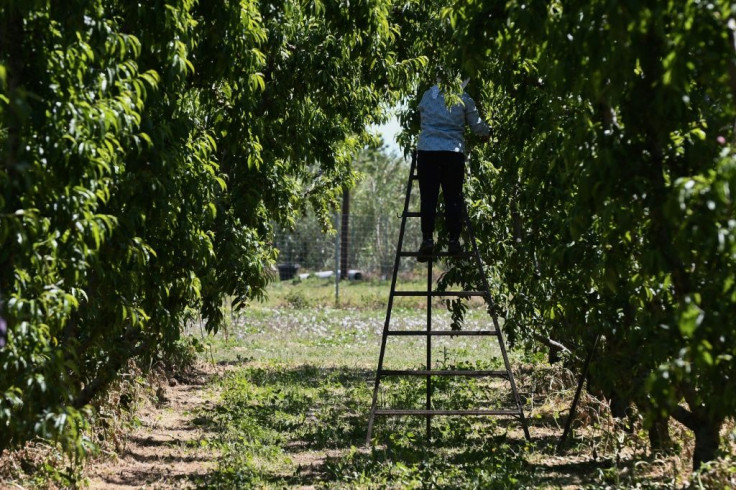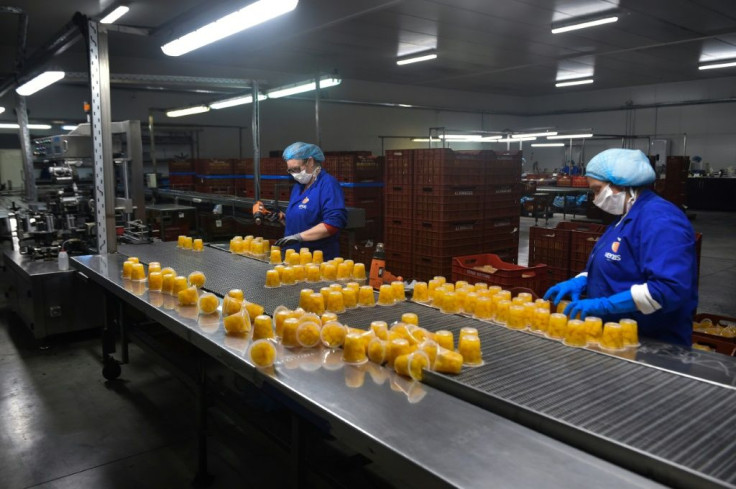Greece Eases Border Lockdown To Bring Harvest In

In a field near the city of Veria, the heartland of Greece's peach country, a handful of Albanian farm workers are standing on ladders, picking fruit.
Normally, it takes around 20 people to do this kind of work, says the farm's owner Panagiotis Gountis.
But with coronavirus restrictions impeding labour movement, he only has six this year.
"Without Albanians, we would not have a single peach tree (bearing fruit)," Gountis told AFP.
Albania supplies most of the thousands of seasonal labourers that normally work on Greek fruit farms this time of year.
Authorites are unable to provide exact figures, noting that many foreign labourers in previous years came on tourist visas and worked illegally.
Around 15,000 farm labourers are required each year in the fruit-producing regions of Imathia and Pella in northern Greece, says Antonis Markovitis, head of an association representing around 500 growers.
Foreign labour is necessary as usually only few of Greece's thousands of unemployed sign up.
A group of lawmakers from Prime Minister Kyriakos Mitsotakis' party in April warned there was an "imminent danger" that a range of harvests could be affected by the worker shortage.
Two coaches full of jobless Greeks recently rolled in from Kozani, one of the areas in Greece hardest hit by unemployment.
But typically two-thirds of Greeks find the work too demanding and leave, farmers here say.
"It's hard to believe that in an area with 20 percent unemployment, we cannot find field labourers," notes Markovitis.
According to the Greek state unemployment agency, some 8,400 jobless applied for farm work in March nationwide.
Last year, the equivalent was over 9,500.
Pavlos Satolias, head of the Nea Paseges farmers' confederation, says there is an urgent need for the maintainance of fruit trees, vineyards and vegetable fields.
Part of this year's asparagus harvest has already been lost because of insufficient labour, he noted.

To address the shortage, the Greek agriculture ministry on May 1 launched a scheme to allow foreign farm labourers into the country, making an exception to coronavirus border lockdown rules.
The vast majority are expected to come from Albania.
Around 90 Albanian labourers crossed the border this week, said Christos Yiannakakis, head of Greece's association of pear and stone fruit producers, which include apricots, cherries, plums, and peaches.
Some are also expected from Bulgaria, but additional labour may have to be relocated from strawberry and orange harvests in southern Greece, he said.
In Tirana, it is estimated that between 7,000 and 10,000 workers could participate in the scheme.
Under the rules, Greek producers can bring in foreign workers for three months, provided they put them on a two-week quarantine upon entering the country.
Farm associations are also responsible for testing the incoming workers.
Amid the debate, little thought seems to have been given to the around 120,000 asylum seekers living in migrant camps around the country.
The UN refugee agency earlier this month urged the Greek government to utilise this readily available source of labour.
"We have to act in a flexible way and give possibilities to refugees to make their own living and integrate," said Philippe Leclerc, the UNHCR's representative in the country.
Asked about the issue, an agriculture ministry source said authorities cannot use "illegal" migrant labour and that in the case of recognised refugees, most are "not suited" to farm work.
There was also a "lack of interest", the official said.
Satolias says authorities have not shown enough interest in recruiting migrant labour.
"For years we've been asking for temporary work permits...so they would not be illegal...but nothing has been done," he said.
"Picking lettuce, it takes two days to learn...it's hardly teaching someone to fly an airplane," he said.
Clandestine workers have faced abuse in Greece before, especially migrants living in the country illegally and fearful of seeking help from the police.
In 2017, the European court of human rights condemned Greece after 30 Bangladeshi workers were injured in a shooting by strawberry farm managers in the Peloponnese in 2013.
The Bangladeshis had demanded weeks of back pay after labouring under extreme heat, and sleeping in shacks without running water.
© Copyright AFP {{Year}}. All rights reserved.





















